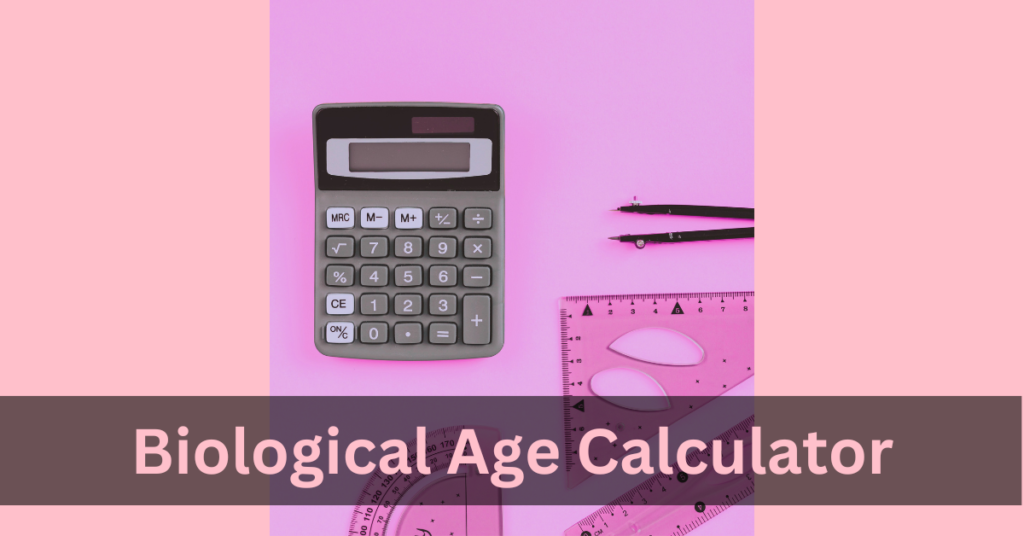Biological Age Calculator
Biological Age – More Than Just A Number
Ever notice how some people seem to stay young while others age quickly? It’s fascinating: “biological age” versus “birth age.” To make sense of this, let’s bring in a fun tool – the Biological Age Calculator.
Defining Biological Age
Biological age is like a health meter for your body. It’s not about how long you’ve lived. It’s about how your body is handling the aging process.
Decoding the Biological Age Calculator
Think of the Biological Age Calculator as a friendly health detective. It gathers clues about your body’s aging journey. It looks at vital signs like blood pressure, cholesterol, and body weight. Some even peek into your lifestyle, like what you eat and how active you are. These clues work together to reveal your biological age.
Why Knowing Your Biological Age Is Important
Finding out your biological age can be a wake-up call. If your biological age is older than your birth, your body hints at healthier living. Better choices can lower your biological age and help you age with grace.
Can You Trust These Calculators?
How reliable are these calculators? Well, it depends. The best ones dig into more health and lifestyle details, so they’re usually more accurate. But remember, these calculators can’t take the place of a doctor. They’re great for starting health chats, sparking awareness, and inspiring better habits.
FAQs
Q: How can I calculate my biological age?
A: The best method is to consider a person’s blood sample.
Q: Can I be biologically younger than my age?
A: Yes, it’s possible to be biologically younger than your chronological age. This happens when people have healthy lifestyles without smoking or other age-accelerating factors. Their cells and tissues remain more youthful.
Q: What is the true biological age?
A: Your true biological age refers to how old your cells are. It’s a measure of your body’s ageing at the cellular level based on your genetics, lifestyle, and health status.
Q: What age is the human biological prime?
A: The 20s and 30s are considered the biological prime for most people. This is when your cells and body systems function at peak performance and youthfulness. Healthy lifestyles can extend your biological prime.
Q: Does lifestyle impact your biological age?
A: Absolutely. A poor diet, inactivity, smoking, and high stress can accelerate cellular ageing. Healthy lifestyle choices keep your cells vibrant and biologically younger.
Q: What health data is used to calculate biological age?
A: Key biomarkers like cholesterol levels, blood pressure, VO2 max, and lung capacity provide insight into cellular ageing. These are used along with genetics, diet, and lifestyle data.
Q: Can I slow down biological ageing?
A: Yes! A healthy diet, exercise, stress reduction, and avoiding smoking can all help maintain your cells in a more youthful state as you chronologically age.
Q: Why do some people age faster biologically?
A: Genetics, chronic health conditions, poor lifestyle choices, and high stress can speed up biological ageing at the cellular level. This causes their body to decline faster.
Q: How often should I check my biological age?
A: Checking your biological age at least annually helps monitor your cellular health over time. More frequent checks may motivate healthy behaviours.
Q: What’s the best way to improve my biological age?
A: Adopting a healthy diet, exercise, sleep, and stress relief habits has the biggest impact on reducing biological age. Limiting alcohol helps too.
Conclusion: Harness the Power of Your Biological Age
The Biological Age Calculator is a neat tool that lets you know your body better. It reveals how your daily choices affect your health and how making a switch can lead to significant improvements. So, why not try it out? Find your biological age. Let it guide, inspire, and nudge you toward a healthier, happier you.
If you want to try More Calculator like this one, Click here.



